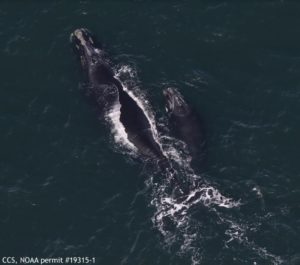
The approximately two month old calf of right whale ‘Harmonia’ playing alongside a channel marker in Cape Cod Bay.
Credit: Center for Coastal Studies, NOAA permit #19315-1
HYANNIS – New federal regulations will soon tighten around the lobster industry in an effort to save a quickly-vanishing whale species, but some conservation groups including the New England Aquarium said that it isn’t tight enough.
The new regulations, announced Tuesday by the National Oceanic and Atmospheric Administration, go into effect just before the end of the month.
They are expected to reduce the risk of death and serious injury caused by North Atlantic right whales becoming entangled in fishing gear by 69 percent.
The species of marine animal currently numbers less than 370 and is experiencing an “Unusual Mortality Event” that has led to 50 dead whales since 2017, mostly due to entanglements and ship strikes.
Changes to existing fishing regulations include reducing the general number of buoy lines in the water, using weaker lines whales can break free of and improving how fishing gear is marked so NOAA can identify the gear if entanglements do occur.
When it comes to fishing areas, one seasonal buoy line closure area will see its boundaries extended, while two new areas will be added where vessel operators are prohibited from fishing for lobster or Jonah crab.
The restricted areas include the waters south of Martha’s Vineyard and Nantucket between the months of February and April.
Ropeless trap or pot gear would still be allowed in the areas, as they pose little risk to the right whales, according to NOAA.
The New England Aquarium issued a statement in response to the new regulations, saying that they are “disappointed that a final federal aimed to protect North Atlantic right whales from fishing gear entanglements is lacking more aggressive measures.”
They added that the regulations are inadequate and will not protect the endangered whale from extinction.
Scientists with the aquarium said that regulations need to reduce the risk of injury and death by at least 80 percent, rather than the 69 percent outlined by NOAA’s latest rules.
They also said that the new rules do not outline an effective pathway to transition the industry towards ropeless fishing technology, and does not make existing fishing gear weak enough to prevent lethal entanglements.
“It is clear that we humans are the primary cause of serious injuries and mortalities to right whales. We are also the solution, but saving this species from extinction requires bold and decisive action,” said representatives of the Aquarium in the statement.























